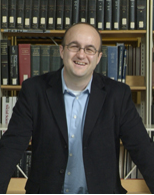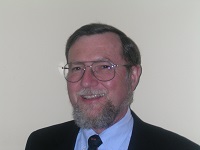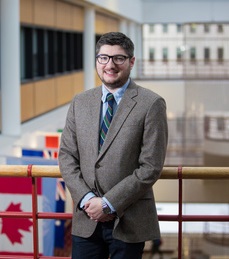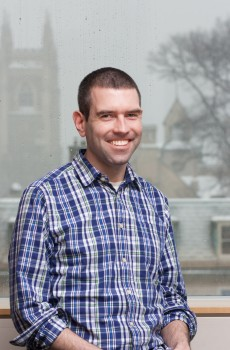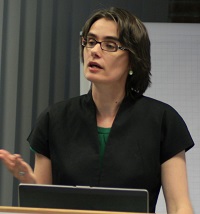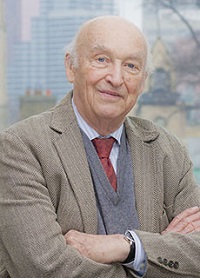Members
In Memoriam
Members
Professor Baker is a graduate of the University of Toronto Faculty of Law and holds a Ph.D. in Political Science from the University of Calgary. His research focuses on the separation of powers, particularly the relationship between the courts and the representative branches. His book, Not Quite Supreme, considers the limits of the Supreme Court of Canada’s power to settle political controversies and offers a spirited defense of a Parliament’s role in constitutional interpretation. Professor Baker has written on a number of constitutional controversies including the use of retroactive remedies in same-sex equality cases and has co-authored articles on the institutional politics behind the rules of evidence in sexual assault cases and the strategic maneuvering behind the Supreme Court rulings on prisoners’ voting rights.
Professor Baker is currently investigating the nature of executive power in Canadian constitutionalism. He is also conducting a study on the impact of federalism on Canadian criminal justice policy. Professor Baker is interested in a wide variety of issues related to law & politics, including Anglo-American constitutional theory, Canadian legal history, federalism and deliberative democracy.
Nicole Bernhardt is an Assistant Professor in Political Science at the University of Toronto Scarborough. Her research program assesses the promise of human rights policy for combating social inequalities and advancing anti-racism, and addresses the question: how can the institutional powers built into the Canadian human rights system be mobilized to respond to problems of social inequality?
Her work has appeared in the Canadian Journal of Political Science, Economic and Industrial Democracy, Teaching in Higher Education and edited feminist political science collections published by UBC Press and University of Alberta Press. She received her PhD in Politics from York University for which she was awarded an Ontario Graduate Scholarship and the Abella Scholarship for Studies in Equity. A former public servant, Nicole has worked as a policy advisor for the Anti-Racism Directorate and as a human rights officer for the Ontario Human Rights Commission.
Geoffrey Callaghan is an Assistant Professor in the Department of Political Science at the University of Windsor. He earned his Ph.D. in Legal and Political Philosophy at McMaster University and holds a Master of Studies in Law (MSL) from the University of Toronto. He was a postdoctoral fellow at McGill Law and a visiting scholar at the University of Toronto Law School. His research lies at the intersection of legal, political and social thought, having published on topics ranging from judicial process, to styles of political representation, to conceptual forays into politics and the law. He is currently working on a large-scale project (funded by SSHRC) examining the role and influence of interveners on court proceedings at both the Supreme Court and lower court levels.
Stéphanie Chouinard is an Assistant Professor in the Department of Political Science at the Royal Military College of Canada (Kingston). She earned her Ph.D. in Political Science at the University of Ottawa, for which she was awarded a Vanier Scholarship and a fellowship from the Baxter & Alma Ricard foundation. She has been a postdoctoral fellow of the Faculty of Law at the Université de Montréal and a visiting scholar at the University of Edinburgh. Her research interests focus on the relationship between courts and minorities in democratic systems, and particularly the Supreme Court of Canada's impact on the evolution of official-language rights and Aboriginal self-determination rights. She is also interested in territorial and non-territorial autonomy arrangements for linguistic minorities in the world.
Dr. Chouinard has published in Ethnopolitics, the Language Rights Review, Language Minorities and Society, and the International Journal of Canadian Studies, among others.
Nicole De Silva is an Assistant Professor in the Department of Political Science at Concordia University in Montreal. She holds a DPhil in International Relations from the University of Oxford.
Her research broadly focuses on the politics of institutions that promote legal accountability and human rights. She examines how these institutions develop and mobilize diverse actors around the law. While she primarily focuses on international courts and tribunals, she also studies Canada’s human rights commissions and tribunals.
Her research has appeared in journals such as the Canadian Journal of Political Science, Annals of the American Academy of Political and Social Science, and American Journal of International Law, and in edited volumes on international law and courts. Her research on international courts also has received several awards from the International Studies Association and British International Studies Association.
Minh Do is an Assistant Professor at the University of Guelph in the Political Science Department. Her research interests lie at the intersection of Canadian law and politics, public policy, and Indigenous politics. Her work to date has focused on the implementation of the duty to consult and accommodate Indigenous peoples in B.C.'s Environmental Assessment process. She is particularly interested in how judicial decisions structure policy actors' behaviours, choices, and strategies. Her work to date has been published in the Canadian Journal of Political Science and the International Journal of Canadian Studies. She completed her BA at the University of Victoria, MA at the University of Waterloo, and PhD at the University of Toronto.
Greg Flynn, McMaster University
Greg Flynn is a teaching stream, assistant professor in the Department of Political Science at McMaster University in Hamilton, Ontario. He has a law degree from the University of Western Ontario, was called to the Bar in 1998 and practised law for five years before returning to academia and continues to be a member of the Law Society of Upper Canada. He earned an MA in Canadian politics and a PhD in comparative public policy from McMaster and has been teaching in the department of Political Science since 2006.
Dr. Flynn's teaching and research interests focus on the intersection of law, public policy and public administration as well as the role of law and courts in democratic politics. His work has been published in journals such as Parliamentary Affairs, Journal of Parliamentary and Public Law, Canadian Public Policy, Canadian Public Administration, and Canadian Political Science Review as well as a number of book chapters. His current work involves consideration of judicial review/activism and administrative and legislative decision making processes and outcomes as well as the impact of courts on elections in Canada.
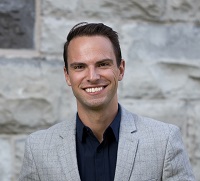
Paul Gardner is Assistant Professor of Politics in the Department of Political Studies and a Research Fellow in the Centre for Studies on Democracy and Diversity at Queen's University in Kingston, Ontario. Paul earned his Ph.D. in 2015 from Princeton University and was a post-doctoral fellow at Syracuse University. His research and teaching interests are broadly in American law and politics. His current research is focuses on inter-branch influences on judicial outcomes. One stream of research examines how governments can support private claiming behavior by litigants. The second stream of research examines how the elected branches, and especially the president, influence Supreme Court decision making. Paul’s work has appeared in journals including Journal of Politics, Presidential Studies Quarterly, Constitutional Studies.
Ian Greene has taught public policy and administration at York University since 1985. He earned a B.A. from the University of Alberta, and an M.A. and Ph.D. from the University of Toronto. He worked in Alberta's public service for four years in the 1970s and 1980s both as a middle manager, and Ministerial Assistant.
Greene is a University Professor Emeritus in the School of Public Policy and Administration, and Master Emeritus of McLaughlin College. He was the founding Director of York’s Masters program in Public Policy, Administration and Law. He is a past Chair of the University Senate, and a former Associate Dean in the Faculty of Arts.
Greene’s most recent book is The Charter of Rights and Freedoms (2014). He is also author The Courts (2006), which is part of the Canadian Democratic Audit series. He was the principal author of Final Appeal, (1998), which analyses decision-making in Canadian appeal courts, and is based on interviews with 101 of Canada’s appellate court judges, including Supreme Court of Canada judges. His co-authored book with David Shugarman, Honest Politics, (1997) studies the ethics regimes for Canadian cabinet ministers. His other books are The Charter of Rights (1989), and Judges and Judging (1990, with Peter McCormick). As well, he was a member of the research team, led by Prof. Maureen Mancuso at the University of Guelph, which published A Question of Ethics in 1998 (second edition, 2006). He has authored more than 40 academic journal articles or book chapters. He is a frequent media commentator regarding issues concerning public sector ethics, and judicial decisions.
Mark S. Harding is an Assistant Professor in the Department of Political Science at the University of Guelph. Dr. Harding completed his graduate work in Political Science (MA, PhD) at the University of Calgary. His research and teaching interests include judicial politics, Canadian politics, bills of rights in Commonwealth countries, political theory, constitutionalism and political institutions. Prior to joining the University of Guelph, he taught at the University of Calgary’s School of Public Policy in its MPP program. His main focus is examining and comparing the growth of judicial power in Canada, New Zealand, and the United Kingdom. He also researches how the Supreme Court of Canada defines the role of other political institutions through its jurisprudence and the Court's use of “Charter values." Finally, he is researching situating Canada within the literature of political and legal constitutionalism. His work has appeared in the National Journal of Constitutional Law, Review of Constitutional Studies, and the American Review of Canadian Studies.
Matthew Hennigar is an Associate Professor of Political Science at Brock University. His research and teaching focus on the legal and institutional dimensions of Canadian and Comparative politics, in particular the judiciary's organization and impact on public policy, rights litigation, constitutional politics, and the Canadian government's legal bureaucracy.
His recent and on-going research projects focus on judicial appointment in Canada, the structure of the Attorney General's office, and government litigation under the Charter of Rights and Freedoms. He is a co-author of Canadian Courts: Law, Politics, and Process (with Lori Hausegger and Troy Riddell) and his work has appeared in the Canadian Journal of Political Science, Law and Society Review, the International Journal of Constitutional Law, Canadian Public Administration, Comparative Politics, and the Osgoode Hall Law Journal.
Janet Hiebert is a Professor Emeritus in the Department of Political Studies at Queen's University. Her most recent book, with Emmett Macfarlane and Anna Drake, is Legislating under the Charter: Parliament, Executive Power, and Rights (University of Toronto Press, 2023). She is also the author, with James Kelly, of Parliamentary Bills of Rights. The Experiences of New Zealand and the United Kingdom (Cambridge University Press, 2015). She is the author of two books about the Canadian Charter of Rights and Freedoms, Charter Conflicts: What is Parliament’s Role? (McGill-Queen's University Press, 2002), and Limiting Rights: The Dilemma of Judicial Review (McGill-Queen's University Press, 1996), along with numerous papers and chapters on the politics of rights and on campaign finance laws in Canada.
She has served as a member of the Ontario Electoral Boundaries Commission, an independent, non-partisan body with responsibility to readjust the electoral boundaries in the province of Ontario. Her current research project examines the use of bills of rights and other statutory instruments to alter the norms of legislative decision-making, with a particular focus on Canada and Australia.
Ran Hirschl (Ph.D., Yale University) is the David R. Cameron Distinguished Professor in Law and Politics. He studies constitutional law and constitutional institutions and their intersection with comparative politics and society. He is the author of several major books including City, State: Constitutionalism and the Megacity (Oxford University Press, 2020)—winner of the 2021 Stein Rokkan Prize in Comparative Social Science Research; Comparative Matters: The Renaissance of Comparative Constitutional Law (Oxford University Press, 2014)—winner of the 2015 American Political Science Association (APSA) Herman Pritchett Award for the best book on law and courts; Constitutional Theocracy (Harvard University Press, 2010)—winner of the 2011 Mahoney Prize in Legal Theory; and Towards Juristocracy: The Origins and Consequences of the New Constitutionalism (Harvard University Press, 2004), which won the 2021 Lasting Contribution Award from the American Political Science Association’s Law and Courts Section.
Professor Hirschl is also the author of over 150 articles and book chapters on comparative public law, published in social science journals (e.g. Comparative Politics, Political Theory, Political Research Quarterly, Law & Social Inquiry, Journal of Political Philosophy, Constellations, Human Rights Quarterly, Revue Française de Science Politique, Annual Review of Political Science, Annual Review of Law and Social Science), law reviews (e.g. the University of Chicago Law Review, Texas Law Review, Harvard International Law Journal, American Journal of Comparative Law, and the International Journal of Constitutional Law) and in agenda-setting edited collections (e.g. The Cambridge Companion to Comparative Constitutional Law, The Oxford Handbook of Political Science, The Social and Political Foundations of Constitutions, Constitutionalism in Context, and The Future of Economic and Social Rights). Professor Hirschl has won academic excellence awards in five different countries; and has attracted over $7.5 million in competitive research grants, including, Canada Research Chair in Constitutionalism, Democracy and Development, Killam Research Fellowship awarded by the Canada Council of the Arts, Max Planck Fellow Group Award, and most recently a coveted Alexander von Humboldt International Research Award—the most highly-endowed research award in Germany. He is the recipient of a University of Toronto teaching award and the APSA & Pi Sigma Alpha certificate for outstanding teaching in political science. Hirschl is also co-editor of Cambridge University Press book series on comparative constitutional law and policy. He has served as co-president of the International Society of Public Law (ICON-S), and held distinguished visiting professorships at Harvard, NYU, the University of Texas at Austin, and NUS, as well as fellowships at the Center for Advanced Study in the Behavioral Studies at Stanford, Princeton University, and with the Max Planck Society. Hirschl is also the editor of a Cambridge University Press book series on comparative constitutional law and policy. He has delivered dozens of named keynote lectures at conferences and universities worldwide. His work on comparative constitutional law has been translated into various languages (from French, Dutch, Portuguese, and Spanish to Turkish, Hebrew and Mandarin), discussed in numerous scholarly fora, cited by jurists and in high court decisions worldwide, and addressed in media venues from the CBC, The New York Times and Folha de São Paulo to Le Figaro, Deutsche Welle, and the Jerusalem Post.
As of 2014, Professor Hirschl is Fellow of the Royal Society of Canada (FRSC). The official citation describes him as “one of the world’s leading scholars of comparative constitutional law, courts and jurisprudence.”
James Kelly, Concordia University

Andrea Lawlor is an Associate Professor at McMaster University. Her research focuses on Canadian law and public policy with an emphasis on election law and immigration policy. She is the author of the collaborative volume, “Provincial Battles, National Prize?” and the co-editor of “Political Elites in Canada: Power and Influence in Instantaneous Times” with Alex Marland and Thierry Giasson. Her research, which combines public opinion, media and public policy data can be found in the Canadian Journal of Political Science, the Journal of Social Policy, the Journal of Ethnic and Migration Studies, among others. She has also published work on Canadian and comparative political institutions, including the Senate, the Supreme Court and Cabinet in Comparative and Commonwealth Politics, Canadian Parliamentary Review and Canadian Public Administration. Dr. Lawlor holds an MA (UBC) and PhD (McGill) in Political Science and an MSL (Western) in Law.
Emmett Macfarlane is a Professor of Political Science at the University of Waterloo. His main research interests focus on the intersection of governance, constitutional law, and public policy, with a particular focus on the Supreme Court of Canada, Parliament, and the Charter of Rights. Several other ongoing projects include work on constitutional change, unwritten constitutionalism, and a comparative project on the regulation of online hate speech in Canada, New Zealand, and the United Kingdom.
His first book, Governing from the Bench: The Supreme Court of Canada and the Judicial Role (UBC Press, 2013), examines the internal workings and judicial behaviour at the Court. His second book, Constitutional Pariah: Reference re Senate Reform and the Future of Parliament (UBC Press, 2021) is a study of the Senate, Senate reform, and constitutional change. His latest book, with Janet Hiebert and Anna Drake, is Legislating under the Charter: Parliament, Executive Power, and Rights (University of Toronto Press, 2023). He is also the editor of Constitutional Amendment in Canada (University of Toronto Press, 2016), Policy Change, Courts, and the Canadian Constitution (University of Toronto Press, 2018), Dilemmas of Free Expression (University of Toronto Press, 2022), and Constitutional Crossroads: Reflections on Charter Rights, Reconciliation, and Change (with Kate Puddister) (UBC Press, 2022).
He has published over 25 papers in various journals and edited books, including the International Political Science Review, International Journal of Constitutional Law (I-CON), Canadian Journal of Political Science, Canadian Public Administration, Supreme Court Law Review, Osgoode Hall Law Journal, Alberta Law Review, National Journal of Constitutional Law, McGill Law Journal, Review of Constitutional Studies, and Ottawa Law Journal.
Andrew McDougall is Assistant Professor of Political Science at the University of Toronto Scarborough (as of July 1 2019), where he focuses on Canadian Politics and Public Law. He is interested in particular in federalism, Quebec nationalism, language politics, and the politics of the judiciary. His work has appeared in Canadian Public Administration, Publius: The Journal of Federalism (with Robert Schertzer and Grace Skogstad) and he is a co-editor of Roads to Confederation: the Making of Canada, 1867, a major, two volume bilingual collection on Canadian Confederation (with Jaqueline Krikorian, Robert Vipond, David Cameron and Marcel Martel.) A called lawyer, he holds an MA and LL.B. from Queen’s University and a Ph.D. from the University of Toronto.
Danielle McNabb is an Assistant Professor of Political Science at Brock University. Her research areas are Canadian public law and criminal justice policy and administration. A central part of her work in public law examines forms of legal mobilization including the role and impact of interveners in Canadian courts. With respect to criminal justice, much of her work has focused on policing and police oversight, as well as political and legal responses to sexual violence. Her work has appeared in the Canadian Journal of Political Science, Canadian Journal of Law and Society, Review of Constitutional Studies, Windsor Yearbook of Access to Justice, and Women & Criminal Justice, among other venues. In addition to her research, she teaches courses on courts and politics, government, and criminal justice policy in the Forensic Psychology and Criminal Justice (FPAC) program at Brock.
Eleni Nicolaides (King's University College at Western University

Dr. Eleni Nicolaides is an Assistant Professor in the Department of Politics and International Relations at King’s University College at Western University. Eleni studies Canadian law, politics, and public policy. More specifically, her research focuses on the Charter of Rights and Freedoms, interest group litigation, third-party interventions, legislative replies to judicial rulings, medical assistance in dying policy, and the notwithstanding clause. She completed her BA and MA from the Department of Political Science at Brock University, and her PhD in Law/Politics and Public Policy/Governance from the Department of Political Science at the University of Guelph.
Kate Puddister is an Associate Professor at the University of Guelph. Kate’s work assesses the interaction between political actors and the judiciary, and the judicialization of politics. More specifically, her work looks at the litigation behaviour of governments and instances where political actors rely on courts to make political and normative decisions.
Professor Puddister's work focuses on how judicial review can benefit elected officials, why political actors empower courts, and how litigation can be a viable political strategy. This focus considers the implications of this relationship between elected officials and courts on judicial independence and the separation of powers in Canada. Her most recent project undertakes a comprehensive analysis of the Canadian reference cases and addresses why governments delegate decision-making power to the courts in reference case episodes.
Dr. Emmanuelle Richez’s research examines law and politics in Canada and other advanced liberal democracies, with a particular focus on ethno-cultural minority rights. Her doctoral dissertation measured the impact of the Canadian Charter of Rights and Freedoms on cultural rights and policies, notably in the areas of Multiculturalism, language, and Aboriginal affairs. It received the Joseph and Sandra Rotman Prize for having made a distinctive contribution to the understanding and
conduct of public policy in Canada.
Dr. Richez is currently involved in several research initiatives on courts and politics. She is conducting a comparative analysis of the effects of bills of rights on Aboriginal Peoples in Australia, Canada, New Zealand, and the United States. Her other research projects pertain to the Supreme Court of Canada’s role in promoting access to justice and to Canada's compliance with international law.
Troy Riddell has teaching and research interests in law and politics, constitutional rights and criminal justice policy. He is a co-author of Canadian Courts: Law, Politics and Process (with Lori Hausegger and Matthew Hennigar) and his work has appeared in such venues as Canadian Journal of Political Science, Law and Society Review, Osgoode Hall Law Journal and the Canadian Journal of Criminology and Criminal Justice Policy.
His current research projects involve analyzing judicial decision-making in Canadian courts of appeal and assessing and trying to explain the policy and behavioural responses of the police to Charter of Rights decisions.
Robert Schertzer, University of Toronto

Robert Schertzer is an Assistant Professor at the University of Toronto. He publishes and teaches on the intersection of three areas: federalism; constitutional and judicial politics; and, the management of diversity. His work tends to focus on Canada, from a broadly comparative perspective.
He is currently working on two related research agendas. The first examines the role of high courts in diverse federations. The principal output in this area is a forthcoming monograph, The Judicial Role in a Diverse Federation: Lessons from the Supreme Court of Canada, which will be published with the University of Toronto Press in May 2016. The second agenda examines the representation of ethno-national minorities in central political institutions, including high courts.
Robert completed his PhD at the London School of Economics (in 2012). He also has a decade of experience in the federal public service working in the areas of intergovernmental relations, immigration and social policy.
Byron Sheldrick, University of Guelph
Byron Sheldrick is the Associate Dean (Academic) for the College of Social and Applied Human Sciences and a Professor of Political Science at the University of Guelph. He studied Political Science at Carleton (BA) and York University (MA, PhD), and has a law degree from the University of Toronto. Before joining the University of Guelph, he taught law at Keele University in the United Kingdom and politics at the University of Winnipeg.
His research examines social movements and their interactions with structures and institutions of law. He is the author of Perils and Possibilities: Social Activism and the Law (Fernwood, 2004) and Blocking Public Participation: The Use of Strategic Litigation to Silence Political Expression (Wilfrid Laurier University Press, 2014). He has also written on concepts of legal empowerment and administrative law. He is currently working on a book project (with Dennis Baker), examining the study of law as a social science.
Dave Snow is an Associate Professor in the Department of Political Science at the University of Guelph. His research interests include public policy, criminal justice, constitutional law, and federalism. He is the author of Assisted Reproduction Policy in Canada: Framing, Federalism, and Failure (2018, University of Toronto Press), and the co-author (with F.L. Morton) of the edited textbook Law, Politics, and the Judicial Process in Canada, 4th edition (2018, University of Calgary Press). His current SSHRC-funded research project involves an examination of the Supreme Court of Canada’s jurisprudence on reasonable limits on Charter rights.
Dagmar Soennecken (PhD, Toronto) is an Associate Professor in the School of Public Policy and Administration at York University. She is cross-appointed to the Department of Social Science (Law & Society Program). Dagmar regularly teaches courses on social movements and legal mobilization, Canadian constitutional law and politics and law, citizenship & migration.
Her research focuses on comparative politics and public policy in the EU and North America. Dagmar is particularly interested in questions concerning law and the courts as they relate to citizenship and migration. Past work has focused specifically on asylum policies in Germany and Canada.
Her work has appeared in Comparative Migration Studies, Droit et Société, Studies in Law, Politics and Society, the Review of European and Russian Affairs and Law & Policy (forthcoming).
In Memoriam
Peter Russell was Principal of Senior College and professor emeritus of political science at the University of Toronto where he began teaching in 1958. He was a Canadian pioneer in the political science of the judiciary. Among his Canadian publications, are The Supreme Court of Canada as a Bilingual and Bicultural Institution, The Judiciary in Canada: The Third Branch of Government and an edited volume, Canada’s Trial Courts. In his post-retirement years, he wrote the award-winning book Canada's Odyssey: A Country Based on Incomplete Conquests, and Sovereignty: The Biography of a Claim. He was an active member of IPSA’s Research Committee on Comparative Judicial Studies, and co-edited volumes on Judicial Independence and the Appointment of Judges.
David E. Smith, OC, FRSC, was Distinguished Visiting Professor at Ryerson University and Professor Emeritus, Johnson-Shoyama Graduate School of Public Policy, University of Regina. He taught in the Department of Political Studies, University of Saskatchewan, Saskatoon, from 1964 until 2004, and is a previous President of the Canadian Political Science Association.
His publications include a trilogy of works on each of the parts of Parliament, as well as books on political parties, the constitution, and federalism. The People's House of Commons: Theories of Democracy in Contention (University of Toronto Press, 2007) won the Donner Prize for the best book in Canadian public policy. Across the Aisle: Opposition in Canadian Politics (University of Toronto Press, 2013) won the Canada Prize in Social Sciences in 2014.
